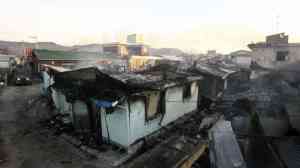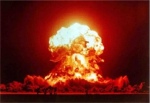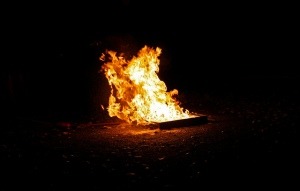
Damaged houses on Yeonpyoung Island
By Bosmosis
In November 2010, North Korean howitzers opened fire on a populated area on Yeonypoung, a South Korean island near their maritime border, killing four people and causing widespread damage. The nearly hour-long barrage was a response to South Korea’s annual military exercises, during which the South Korean army fires artillery from Yeonypoung into waters they control but which North Korea also claims. Every year since the attack, North Korea has protested the drills, and last year was no different. Like the asshole at a nightclub who threatens to beat the crap out of you for brushing against his shoe, North Korea warned that if the drills didn’t stop, they would turn the South Korean presidential office (“The Blue House”) into a “sea of fire.”
As a writer and language teacher who has been living in South Korea for 15 years, North Korea’s warped sense of proportion is only slightly more disappointing to me than their continued reliance on the “sea of fire” cliché, which has been so thoroughly abused that it’s hard to recall a time before it was commonplace. The phrase first appeared in the inter-Korean dialogue in 1994, as nuclear anti-proliferation talks between North and South broke down. With the talks spiraling toward collapse, North Korea’s lead negotiator, Park Young Su, in an apparently unscripted outburst, declared that “Seoul will be turned into a sea of fire” and stormed out of the conference room. Concise, memorable, and suggestive of apocalyptic wrath, Mr. Park’s “sea of fire” immediately set the region on edge, but, for reasons we may never know, was considered inappropriate by North Korea’s leader, Kim Il-sung, who had Park sacked a month later.
The ominous phrase faded from use, but was apparently deemed appropriate by Kim Jong-il in 1999, when North Korea threatened to turn both South Korea and the U.S. into a ‘sea of fire’ if attacked. Throughout the following decade, the phrase was hurled about with wanton disregard for both human life and lexical variety: in 2003, when they threatened Seoul with a “sea of fire” while unleashing a barrage of unflattering adjectives on the U.S.; in 2004, when they threatened Japan with an explicitly “nuclear” sea of fire; and a year later, when they threatened to preemptively strike U.S. military bases, turning them into seas of fire while “thoroughly” wiping out anyone who helped them (read: South Korea and Japan).
Perhaps aware of the need to mix it up a little, in 2008, the KCNA warned that “everything will be ashes, not just a sea of fire”, which was encouraging but either contradictory or redundant, depending on how you read it. Later that year, Vice Marshall Kim Il-Chol threatened that a North Korean counterstrike would somehow be “unimaginably more powerful than nuclear weapons,” and that it would “not merely turn everything into a sea of fire but reduce everything treacherous and anti-reunification to debris and build an independent reunified country on it.” I don’t even know what that means, but it sounds eerily like a Stalinist version of the Genesis device from Star Trek II: The Wrath of Khan– a large torpedo that instantly reduces a lifeless planet to subatomic particles, then quickly reassembles it to make it habitable for the North Korean Worker’s Party.
Whatever he had in mind, the imaginative new threat was never elaborated, and North Korea was soon back to their old tricks. In 2010, when the South Korean military set up towers of loudspeakers at the border and repeatedly blared the song “Hit Your Heart” by the K-Pop group 4Minute, the North Koreans threatened to not only blow up the speakers (which is forgivable if you’ve heard the song) but to turn Seoul into a sea of you guessed it.
With the ascension of the 28-year-old Kim Jong-un to power in late 2011, I held out tentative hope for an end to the nuclear brinkmanship, or at least to the hackneyed phrases that accompany it. North Korean defense officials quickly squashed that, declaring that the world “should not expect any changes from us.” As if to underline the point, they warned that the “sea of bloody tears” of the North Korean people and army would turn into a “sea of revengeful fire that burns everything.”
One noticeable change has however occurred under Kim Jong-un’s tenure: rather than conjuring nuclear annihilation, ‘sea of fire’ is used more literally to describe limited attacks involving any sort of fire at all. Case in point: the aforementioned attack on Yeonpyoung Island, in which incendiary shells set fire to fields, trees and a couple dozen buildings. This November, they even threatened to turn individual structures, like the Blue House, into a sea of fire, which would only seem to require a lagoon of fire, or, if you’re feeling generous, a bay. Maybe ambiguity is what they’re going for, or maybe they’re being lazy, but either way it screams rookie mistake. Here in Busan, a city more than 300 kilometers from the DMZ, nuclear missiles worry me. Artillery rounds? Not so much.
It’s hard to square such rhetorical complacency with a country whose fluency in insulting people has inspired the creation of a random insult generator, an Internet honor previously reserved for William Shakespeare. Verbally eviscerating one’s enemies is something of a national pastime in North Korea. According to defectors, this type of invective is instilled in society by the state-run newspapers, which regularly slander enemies of the state in order to rally the people around the ruling clique. If there were an international competition of political “Your Momma” putdowns, North Korea would own the podium every year. I can imagine North Korean high school kids facing off in the schoolyard:
Your mother is such a sycophantic political dwarf that her remarks often reveal her utter ignorance of Juche ideology, to say nothing of her fitness for parenting tomorrow’s revolutionary vanguard!
Is that so? Well your mother is such a half-baked philistine that she couldn’t mercilessly wipe out an enemy bulwark if the Korean people’s glorious victory depended on it!
While they do overuse stock terms to describe us Yankee “imperialists” and our South Korean “puppet” allies, the KCNA have also displayed an ability to stretch and flash their chops, especially during the “brigandish” (one of their favorite adjectives) administration of George W. Bush. The KCNA referred to the Bush team as “a bunch of tricksters and political imbeciles who are the center of a plot breeding fraud and swindle,” and often called them out singly for verbal smackdowns. President Bush, who famously tarred North Korea as a member of an Axis of Evil, was described as a “hooligan bereft of any personality…a half-baked man in terms of morality and a philistine who can never be dealt with.” When Bush had a shoe thrown at him by an Iraqi reporter in 2008, the KCNA waxed poetic, writing that Bush just stood there “like a chicken soaked in the rain.” They landed some of their best zingers on  his cabinet, calling Vice President Cheney a “mentally deranged person steeped in inveterate enmity towards the system [in North Korea]” and Defense Secretary Donald Rumsfeld a “human butcher and fascist tyrant who puts an ogre to shame”.
his cabinet, calling Vice President Cheney a “mentally deranged person steeped in inveterate enmity towards the system [in North Korea]” and Defense Secretary Donald Rumsfeld a “human butcher and fascist tyrant who puts an ogre to shame”.
Despite the chutzpah of these KCNA broadsides, reading them you soon notice that they employ an inordinate number of antiquated words like “trickster” “stooge” and “lackey.” According to Joo Sung-ha, who defected from North Korea and is now a journalist in South Korea, this is because they rely on dictionaries published in the 1960s and have few or no native speakers to proofread their diatribes. The result of this linguistic isolation is that North Koreans roll out our old verbiage in much the same way that Cubans deploy our old Plymouths, Buicks, and Chevys: keeping them in wide circulation despite a dearth of imported parts, polishing them to a surprising luster, and revving them up with obvious relish. OK – denouncing someone as a ‘flunkey’ might not achieve the same degree of cool as a Havana cabbie in a ’52 Ford Victoria, but there’s an oddball charm in the glimpse it offers of a bygone linguistic moment, painstakingly restored by those quirky curators of Cold War bombast.
Having seen their potential, it’s disappointing to pick up the paper and read that we’ve once again been threatened by a “sea of fire”, which now sounds more like an award-winning 5-alarm chili than code for Armageddon. Will KCNA broadcasts someday swear to turn Washington into a “moldering mound of marble” or transform everything below the DMZ into a “rat’s nest of ruined rebar”? I don’t know, but the status quo has got to go.





